
Double Your Impact for the Holidays
Double Your Impact for the Holidays
Your urgently needed year-end gift can go twice as far to provide care and support and accelerate Alzheimer's research this holiday season — and all year long. Show your giving spirit today during this 2x Match Challenge.
Donate NowWhy We Walk: Edward Jones Colleagues Share Their Personal Passion for the Walk to End Alzheimer’s
Edward Jones colleagues and their families continue to make a difference in the fight to end Alzheimer’s in honor of the people they love, their clients, and in support of all those facing Alzheimer's and other dementia. Here you will meet some of the passionate people dedicated to the fight to end Alzheimer’s.
Jack Walsh
Financial Advisor; his story is shared by wife Brenda
For eight years, it was Jack’s passion to help his clients financially prepare for their futures. While we all hope that our future holds only excellent health and joy, it is not always the case.
When we noticed Jack was having memory issues, we wrote it off as normal aging, because there was no family history of Alzheimer’s; there was no indication that something was wrong when we consulted our primary care doctor, and Jack continued to thrive at work. But the memory issues became more frequent and noticeable. In Jack’s eighth year at Edward Jones, the company changed financial systems, and he took on additional secretarial duties amid the COVID-19 pandemic, struggling to adjust.
The journey to getting a diagnosis and subsequent care was a frustrating waiting game. Eventually, in September 2021, we received the results, a diagnosis of early-onset Alzheimer’s disease.
Jack’s diagnosis is nothing short of paradigm-shifting. We are a family of planners, and Jack’s diagnosis made us rethink and change many of our future plans. Thankfully, Jack has done an excellent job in planning for our family’s future; in fact, he prepared for a version of this future. He paid for long-term disability and had other long-term care planning measures in place, including life insurance, so that when he was diagnosed, our family would still have coverage and not be dropped from the policy.
In this challenging time, our faith continues to be our beacon. Over the last year, we have been overwhelmed by the love, kindness, prayers, and generosity of our extended family, friends, and Edward Jones Region 254, and we thank everyone for all of their support.
Mahea Akana
Senior Branch Office Administrator, Georgia
I lost my dad to Alzheimer's in 2017. We missed the signs; it hit us like a ton of bricks one day when he got lost and couldn't find his way home. A kind stranger approached him and asked if she could help. Luckily, she was able to call my mom and he made it home safe.
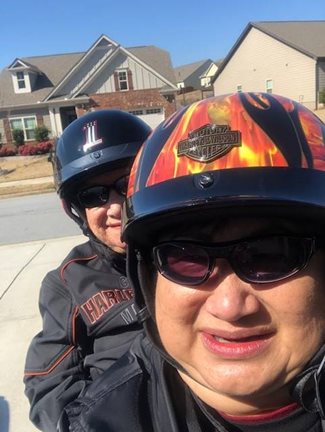 As his disease progressed, it became more difficult for my mom to care for my dad by herself. She had to make the difficult decision to sell their home in Hawaii, which she had lived in since 1965, moving to Georgia to live with me. Shortly after they arrived in 2015, my dad’s condition worsened, and by Labor Day, he was in the hospital and unable to return home.
As his disease progressed, it became more difficult for my mom to care for my dad by herself. She had to make the difficult decision to sell their home in Hawaii, which she had lived in since 1965, moving to Georgia to live with me. Shortly after they arrived in 2015, my dad’s condition worsened, and by Labor Day, he was in the hospital and unable to return home.
My mom visited him every day of the week, sometimes twice a day for the first year he was in his nursing home. Eventually, he had no idea who this person was that came to sit with him and feed him.
We lost my dad a week after my parents’ 60th wedding anniversary. If you have been affected by this disease personally, you know how difficult it is, and why we must all fight by joining the Walk to End Alzheimer’s. I walk for my family, and for yours.
David Bonkowski
Principal, Arizona
My purpose to align my actions and values to positively influence others came to life when I was serving my Edward Jones clients in the field. During my tenure as a financial advisor with Edward Jones, I established many meaningful friendships and relationships, such as my very first clients, who were in their late 70s at the time.
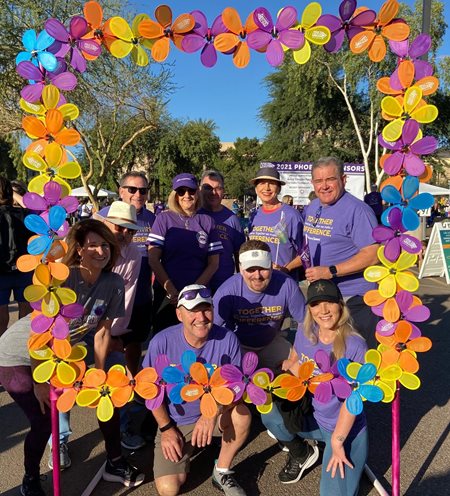 The husband was facing heart disease, and his wife was living with dementia. My client was determined to make sure his wife would be taken care of in the event he passed before her. Unfortunately, a short two years after we established our relationship, he predeceased his wife. Due to financial constraints, his wife had to move in with her daughter, who acted as her caregiver. The demand on her daughter’s time became so great that she had to retire prematurely.
The husband was facing heart disease, and his wife was living with dementia. My client was determined to make sure his wife would be taken care of in the event he passed before her. Unfortunately, a short two years after we established our relationship, he predeceased his wife. Due to financial constraints, his wife had to move in with her daughter, who acted as her caregiver. The demand on her daughter’s time became so great that she had to retire prematurely.
This example was all I needed to see the value in helping other clients plan for their families in the event that this situation became a reality. Following this experience, I vowed to speak to every client over the age of 45 about preparing for the unexpected. I provided advice and guidance on choices they could leverage to mitigate this risk.
Since leaving the field in 2015, my involvement in the Alzheimer's Association has enabled me to continue to give back. Helping to eradicate this disease supports my personal purpose and aligns me with our firm's purpose to positively impact all the communities we serve.
Marlin Hofer
Financial Advisor, Minnesota
As an Edward Jones financial advisor, I’ve seen the impact Alzheimer’s disease has on my clients and their beneficiaries. Two of my clients, a married couple, were taking out more than $10,000 a month to pay for memory care. While the couple was fortunate to have enough savings to pay for their long-term care needs, their children had a tough time watching decades of their parents’ hard work and sacrifice go to paying for care.
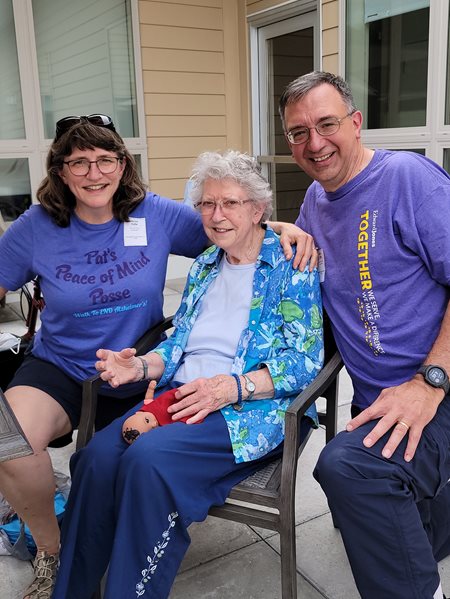 I too found the situation hard to accept. The assets that my clients had planned on leaving to their children and grandchildren as a legacy were completely derailed. Today, I make a point to talk with clients about their protection needs.
I too found the situation hard to accept. The assets that my clients had planned on leaving to their children and grandchildren as a legacy were completely derailed. Today, I make a point to talk with clients about their protection needs.
When my mother-in-law was diagnosed with dementia, my “Why” for being involved in the Alzheimer’s cause and walking in the Walk to End Alzheimer’s became even more personal. My wife Janice and I have now seen the devastating effects of this cruel disease firsthand.
My regional team is working to help the Alzheimer's Association by raising $100,000 this year, nearly five times the $21,400 the region raised in 2021! I know that raising funds helps families I serve, and families like mine. My wife has called the Alzheimer’s Association free 24/7 Helpline many times — a huge resource. Supporting the Alzheimer’s Association is just one way you can support families facing this disease and give back if you have used the services that so many families can and should tap into.
Marie Bromley
Branch Office Administrator, New York
It has been 10 years since I moved from Atlanta to Syracuse, New York to care for my mother, who is living with Alzheimer's. My brothers and I are adopted, and my mother and my father were such amazing people, taking in three children and raising them lovingly as their own. We had a wonderful life! I knew it was my turn to be there for Mom.
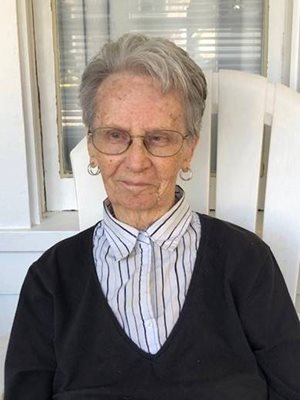 Once I got to New York, my whole world changed; it was clear that things would only get worse. At first, my mom just showed signs of forgetting things; then she got in a car accident and had to stop driving altogether.
Once I got to New York, my whole world changed; it was clear that things would only get worse. At first, my mom just showed signs of forgetting things; then she got in a car accident and had to stop driving altogether.
As the years progressed, so did her disease, and quickly. She now relies on me and my brother for all her care. Together we are bound to give our mom the best quality of life possible. Today, she still knows who we are and remembers our names, for which I am so grateful. After being with Edward Jones for nearly a year, I’ve seen how working with the Alzheimer's Association has helped so many: the resources available to colleagues, clients, and families are amazing. Most importantly, I know that my employer backs me 100% as a caregiver for my mother. I am thankful for the support I have been given and continue to fight this disease by caring for my mom with love.
Spencer Dow
Financial Advisor, Utah
My grandfather, affectionately known as Bampa, was diagnosed with Alzheimer's disease when I was a child. Both Bampa and our nana lived long lives, and their care fell to their sons, which included their spouses and their young children. My mom earned her crown in heaven by caring for her father-in-law to the end, changing his diapers without hesitation.
It wasn't all bad, but it has certainly affected the way I talk and plan with clients for the unexpected. There was no proactive planning for my family's situation, and by the time they realized there should be one, it was too late.
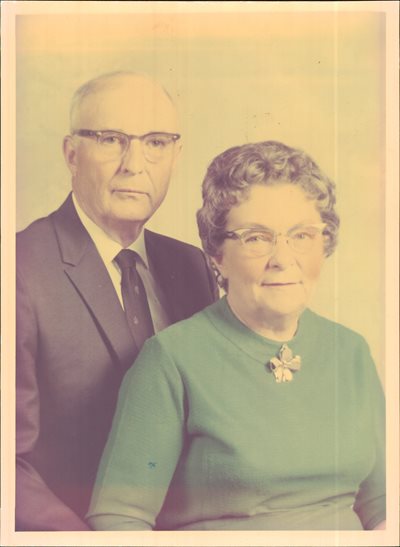 For this reason, we discuss long-term care plans with every client starting at age 60 and document those decisions. Our goal is for families to have a viable plan, and to make it a plan — not a wish. We want clients to understand the realities of the situation and to communicate their plan with their extended family.
For this reason, we discuss long-term care plans with every client starting at age 60 and document those decisions. Our goal is for families to have a viable plan, and to make it a plan — not a wish. We want clients to understand the realities of the situation and to communicate their plan with their extended family.
Proactive steps can help families prepare and transition into the unknown challenges of aging. This is also why I support the Alzheimer's Association.
I decided to combine my passion for biking and for the Alzheimer's cause into one event. With a committee of my colleagues and the Utah Chapter of the Alzheimer's Association, we planned a 100-mile benefit ride for the Alzheimer's Association’s The Longest Day. I plan to continue the event every year and hope to grow its impact in honor of all those affected by this disease.
Katie Schonaerts
Financial Advisor, Missouri
As a child, my sister Emily and l spent a lot of time at our grandparents' house, especially enjoying trips to the family farm. Then we noticed things starting to change: our Grandpa Herbie's kind, funny disposition was less evident. He didn't remember our names or faces. My parents told us that grandpa had Alzheimer's — and that he still loved his granddaughters.
Soon after, during an outing to the farm, Grandpa didn't recognize us, and wondered why we were trespassing. It was a strange feeling. I was sad that things were different — instead of gathering around my grandparents’ kitchen, we met for ice cream in Grandpa’s nursing home dining room.
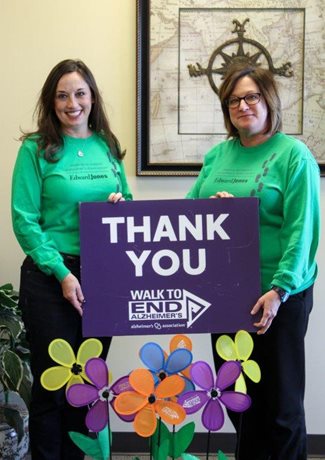 After a lengthy battle with Alzheimer's, Grandpa Herbie passed when I was in high school. After his death, our family didn't talk much about the disease. The topic was too raw, and, frankly, we all were exhausted. When Edward Jones began its partnership with the Alzheimer's Association, I was afraid that some of my worries I felt as a youth would reappear. However, I faced my fear and thought: ‘Now is my time to be strong and give back to the organization that helped us.’
After a lengthy battle with Alzheimer's, Grandpa Herbie passed when I was in high school. After his death, our family didn't talk much about the disease. The topic was too raw, and, frankly, we all were exhausted. When Edward Jones began its partnership with the Alzheimer's Association, I was afraid that some of my worries I felt as a youth would reappear. However, I faced my fear and thought: ‘Now is my time to be strong and give back to the organization that helped us.’
Today, our Edward Jones branch team leads by example and makes a concerted effort to discuss the Walk to End Alzheimer’s with our clients. We connect, we listen and we work to find solutions. By helping increase awareness of Edward Jones' partnership with the Alzheimer's Association, we continue to discover and rediscover our clients’ needs. We walk with our colleagues to make a difference for all families. After seeing the impact of the disease firsthand, I knew I needed to help.
Alva Kennedy
Home Office Associate, Illinois
About three years ago, I started to notice significant changes in my mom's memory. I watched someone who was our family's nurturer, provider and matriarch become forgetful and anxious. Her doctor became concerned and urged her to get evaluated.
The evaluation revealed a truly unexpected Alzheimer's diagnosis. The days and months that followed were a rollercoaster of emotions filled with doctor appointments and the need to provide more and more in-depth care for my mom.
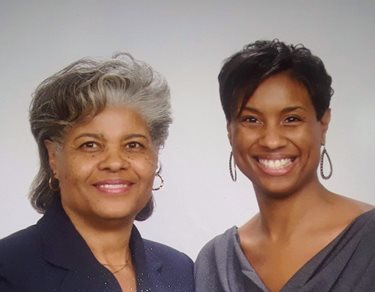 Within two months of her diagnosis and two weeks before the COVID-19 pandemic began, my mom was hospitalized, and we were told that she could no longer live alone. During this time my son, who has autism, was also diagnosed with Crohn's disease. Saying my family was overwhelmed is an understatement.
Within two months of her diagnosis and two weeks before the COVID-19 pandemic began, my mom was hospitalized, and we were told that she could no longer live alone. During this time my son, who has autism, was also diagnosed with Crohn's disease. Saying my family was overwhelmed is an understatement.
Thankfully, throughout this challenging journey, the Alzheimer's Association has been there to provide support. They were part of my first line of defense after mom's diagnosis. The Association created a space where I felt understood and encouraged. I was able to participate in their support groups and take part in a variety of informational seminars. They also provided guidance to connect me to the support services that my mom needed. I am truly grateful for the support of this wonderful organization. It made all the difference.
Nicole MacLean
Sr. Branch Office Administrator, Pennsylvania
My mom was diagnosed with early-onset Alzheimer's disease when she was in her early 60s. One day in 2013, while my dad was fighting cancer, he called me in tears due to my mom’s behavior. I talked him down by reminding him that it was the disease, and not her that was being mean to him. I gave him strategies for how to cope with repetition and other behaviors my mom was displaying. I also reminded him to stay calm with her and to tell her he loves her.
I lost my dad in 2016. He hung on for as long as he could, asking me to promise to take care of Mom. Before he died, I built this little fantasy in my head about how things would be when Mom moved in with me. We would play games, do crafts, visit museums, do mother-daughter things that I would appreciate more now that I was older. Well, I was in for a huge disappointment.
My mom was not my mom. I was her mom. I had to remind her to take a bath, brush her teeth, change her clothes, eat her food, and use her walker. Being a caregiver was so much harder than I ever thought it could be, but not a day goes by that I don't think about her, and wish that I had one more day with her.
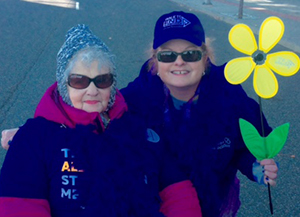 Now it's my turn. I was diagnosed with younger-onset Alzheimer's in August of 2021. Getting this diagnosis early has allowed me to work on my 10-year plan, covering everything from medical to financial needs, with caregivers already in place. I have also been seeking out clinical trials and treatments that are available for those in my stage of the disease progression.
Now it's my turn. I was diagnosed with younger-onset Alzheimer's in August of 2021. Getting this diagnosis early has allowed me to work on my 10-year plan, covering everything from medical to financial needs, with caregivers already in place. I have also been seeking out clinical trials and treatments that are available for those in my stage of the disease progression.
I Walk to End Alzheimer's for my mom, to build awareness and to help raise funds so that one day this disease can be eliminated. I walk in hopes that one day no other family will ever have to watch their loved one disappear into a world we can't understand.
I saw the look of fear in my mom's eyes on those occasions when she didn't remember where she was, who I was, or where her husband of 60 years was. All I could do was hold her hand and talk softly to her and assure her that I loved her. I shared stories from my childhood like I would share them with a friend and eventually, she came back … until one day she didn't. I tell my story and I walk because of her, and I will work to help fight Alzheimer's until a cure is found.
Steven King
Home Office Department Leader, Missouri
A little over a year ago, my family started noticing signs that my mother was becoming more forgetful. A voracious reader, my mom was always able to hold her own on any conversational topic, but things were changing quickly.
After some difficult conversations, my mom made the decision to move close to me and enter an assisted living home. As she was preparing to move from New Jersey to St. Louis, I flew out to help her. This is when reality set in. This was the first time that I realized the emotional toll her loss of memory was having on her — and the emotional endurance I was going to need to help her.
My family has met our ups and downs with success. I've learned about resources such as the Edward Jones Employee Assistance Program, which can help in numerous ways. The Alzheimer's Association was also immensely helpful in providing resources to guide us to the right assisted living residence. The consultants met with my mother to get to know her needs, desires and financial situation, and then guided us to providers.
The consultants arranged and attended visits with us, asked providers questions relevant to our situation and then helped us make a decision. I can't imagine the amount of time this would have taken without their help, and the potential for having made a mistake in choosing the right place for my mother. I am thankful for the help through Edward Jones and the Alzheimer’s Association, and I will continue to spread awareness and share resources about Alzheimer’s for my family, and for yours.
Dani Osborne
Financial Advisor, North Carolina
In 2011, I lost my grandmother to Alzheimer's after her decade-long battle with the disease. The impact of the disease as it progressed is marked in my mind through a number of memories. My grandmother’s house was always meticulous, every item in its place. Then, we would find the butter in a cabinet with the coffee mugs. My grandmother started to confuse our names, and later she forgot them all together. She drove to the general store, forgot why she'd gone, how to get home, and what to do next.
The last memory of connection I have of her was when I massaged her feet as she sat in her chair in the living room of her home. Her gaze was empty; she was present in her body, but I'll never know what was in her mind.
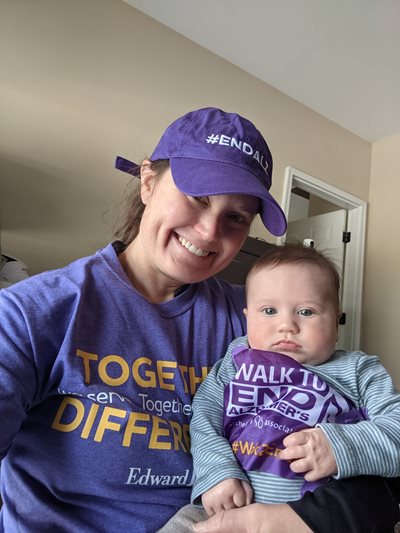 Throughout her illness, my grandmother lived her days at home with family and close friends serving as caregivers. My grandfather's health declined tremendously during my grandmother's illness. He had always been active outside the home, but this became harder to do as he spent more time focused on caregiving and less time getting regular exercise. He passed away in 2015.
Throughout her illness, my grandmother lived her days at home with family and close friends serving as caregivers. My grandfather's health declined tremendously during my grandmother's illness. He had always been active outside the home, but this became harder to do as he spent more time focused on caregiving and less time getting regular exercise. He passed away in 2015.
As a financial advisor, my experience with Alzheimer's makes me passionate about talking to clients about the risks of unexpected healthcare costs in retirement. I coach my clients to think about the things that could go wrong with their plans, and I talk to them about the impacts of other outcomes. The costs are both financial and emotional, and I don't want to be talking about how to plan for care needs for the first time when a client calls to tell me that she or her husband needs care.
I want to be prepared, I want my clients to be prepared, and I want everyone affected by Alzheimer’s to know that you have people ready to help who have been where you have been. We are here, and we are committed to ending Alzheimer’s together.
Bryan Roady
Home Office Leader, Illinois
I am proud to Walk to End Alzheimer’s in honor of my father-in-law, Wayne Tyler, who was diagnosed with Alzheimer's in 2000. After a long journey, he succumbed to the disease in 2015.
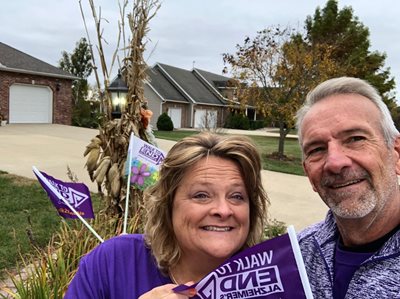 During the decade after my father-in-law’s symptoms began, we navigated all the ‘new normals’ and tried to prepare for the terrible milestones we knew were coming. His wife, Bonnie, was his rock, constant companion and no. 1 caregiver.
During the decade after my father-in-law’s symptoms began, we navigated all the ‘new normals’ and tried to prepare for the terrible milestones we knew were coming. His wife, Bonnie, was his rock, constant companion and no. 1 caregiver.
After 10 years of the disease progressing, Bonnie could no longer take on Wayne's care; it was taking a physical toll on her, as it does on so many caregivers. Wayne spent the last five years of his life in a nursing home, while Alzheimer's continued to take him away from us. I walk in honor of Wayne and all those living with the disease, and I walk in honor of Bonnie, and all the caregivers who do so much every single day.
The Alzheimer’s Association Walk to End Alzheimer’s is the world’s largest event to raise awareness and funds for Alzheimer’s care, support and research programs. Edward Jones continues its investment to enhance the Alzheimer's Association’s care and support programs, provide educational materials for Edward Jones clients and associates and fund critical Alzheimer’s research. Learn more.

The first survivor of Alzheimer's is out there, but we won't get there without you.
Donate Now
Learn how Alzheimer’s disease affects the brain.
Take the Brain Tour
